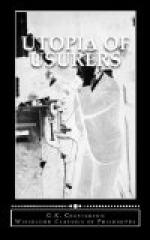The Revival of Reality
Now these things are repeating themselves with an enormous reality in the Irish Revolution. You will not be able to make a Party System out of the matter. Everybody is in revolt; therefore everybody is telling the truth. The Nationalists will go on caring most for the nation, as Danton and the defenders of the frontier went on caring most for the nation. The priests will go on caring most for religion, as Robespierre went on caring most for religion. The Socialists will go on caring most for the cure of physical suffering, as Marat went on caring most for it. It is out of these real differences that real things can be made, such as the modern French democracy. For by such tenacity everyone sees at last that there is something in the other person’s position. And those drilled in party discipline see nothing either past or present. And where there is nothing there is Satan.
For a long time past in our politics there has not only been no real battle, but no real bargain. No two men have bargained as Gladstone and Parnell bargained—each knowing the other to be a power. But in real revolutions men discover that no one man can really agree with another man until he has disagreed with him.
LIBERALISM: A SAMPLE
There is a certain daily paper in England towards which I feel very much as Tom Pinch felt towards Mr. Pecksniff immediately after he had found him out. The war upon Dickens was part of the general war on all democrats, about the eighties and nineties, which ushered in the brazen plutocracy of to-day. And one of the things that it was fashionable to say of Dickens in drawing-rooms was that he had no subtlety, and could not describe a complex frame of mind. Like most other things that are said in drawing-rooms, it was a lie. Dickens was a very unequal writer, and his successes alternate with his failures; but his successes are subtle quite as often as they are simple. Thus, to take “Martin Chuzzlewit” alone, I should call the joke about the Lord No-zoo a simple joke: but I should call the joke about Mrs. Todgers’s vision of a wooden leg a subtle joke. And no frame of mind was ever so selfcontradictory and yet so realistic as that which Dickens describes when he says, in effect, that, though Pinch knew now




